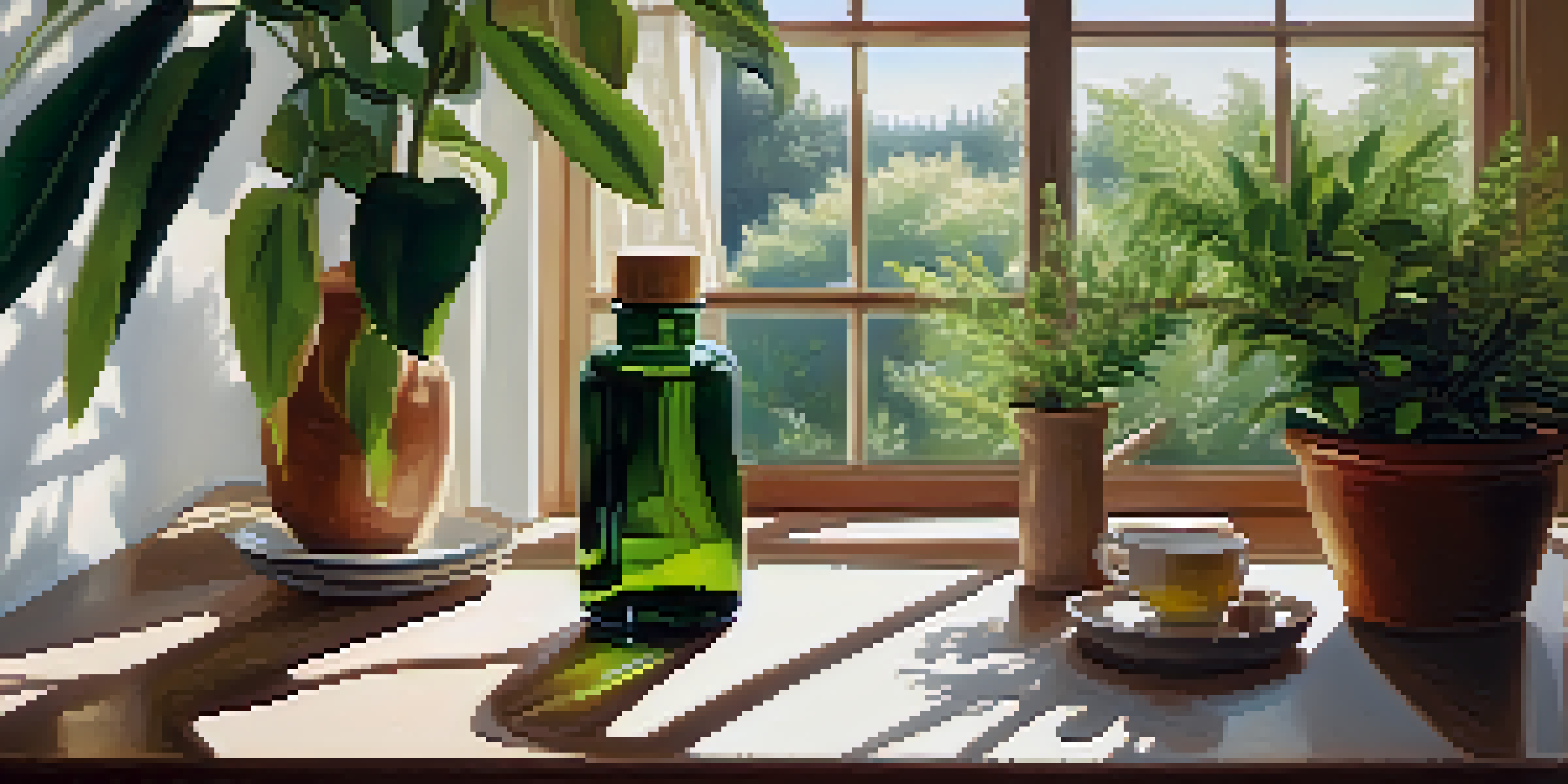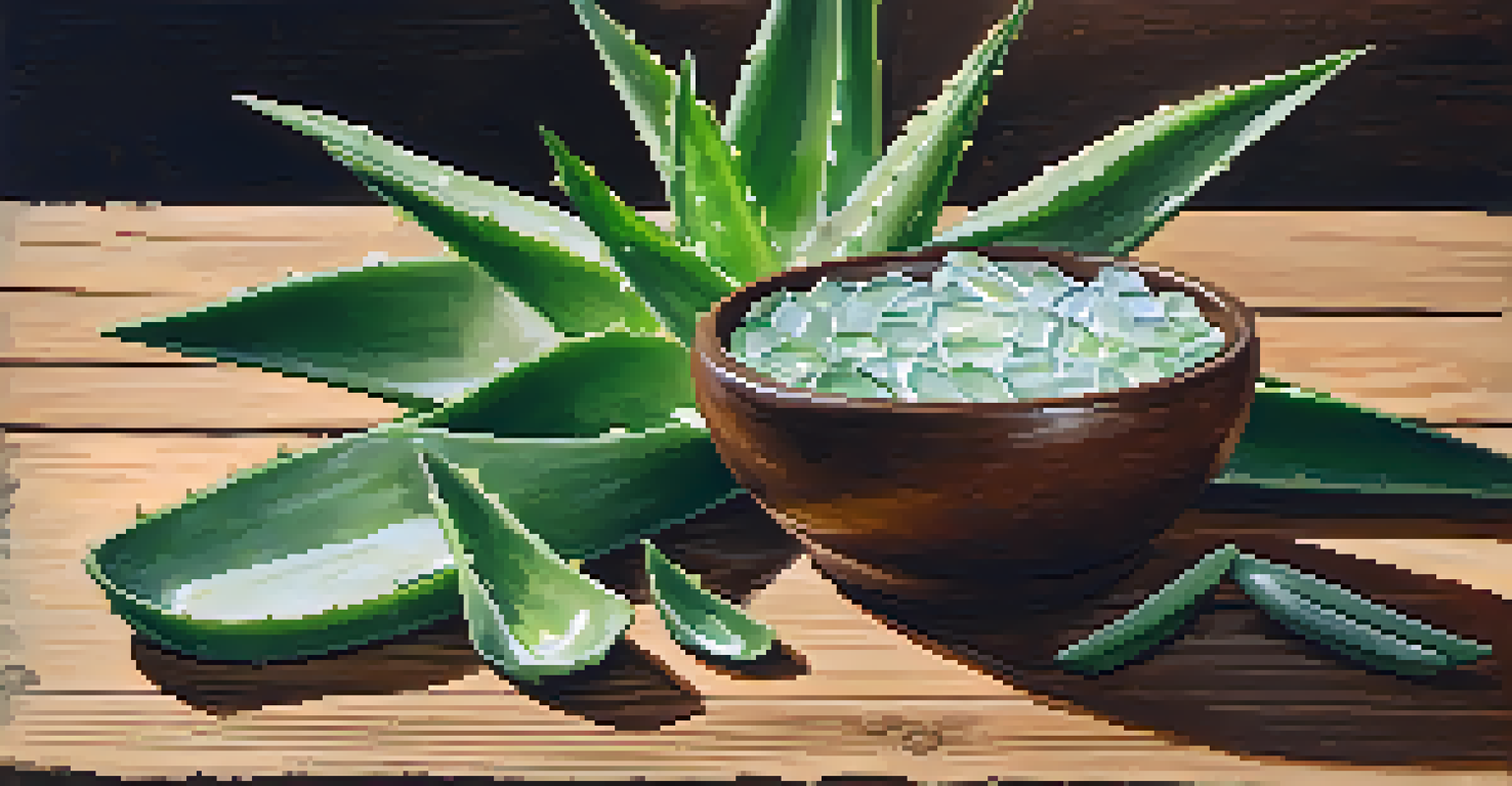Top Naturopathic Remedies for Acne: Nature's Approach

Understanding Acne: Causes and Natural Solutions
Acne is a common skin condition that affects many people, primarily during their teenage years, but it can persist into adulthood. It occurs when hair follicles become clogged with oil and dead skin cells, leading to inflammation and breakouts. Understanding the root causes is essential, as it allows us to explore natural remedies that can help alleviate symptoms and promote healthier skin.
Your skin is a reflection of your overall health.
The factors contributing to acne can range from hormonal changes and stress to dietary choices and skincare routines. This complexity means that a one-size-fits-all approach rarely works. Instead, a holistic view that considers both internal and external influences can lead to more effective treatment options.
Natural remedies often focus on balancing skin health from within and addressing surface-level issues. By harnessing the power of nature, we can find solutions that not only treat acne but also support overall skin vitality.
Tea Tree Oil: Nature’s Antiseptic Powerhouse
One of the most popular natural remedies for acne is tea tree oil, known for its antiseptic and anti-inflammatory properties. Derived from the leaves of the Melaleuca alternifolia tree, this essential oil can help reduce the bacteria that contribute to acne breakouts. When used properly, it can be an effective alternative to more aggressive chemical treatments.

To use tea tree oil, simply dilute it with a carrier oil, like coconut or jojoba oil, before applying it to the affected areas. This dilution helps prevent skin irritation while still delivering the oil's powerful benefits. Many users report a noticeable reduction in redness and swelling after just a few applications.
Understanding Acne's Complex Causes
Acne can stem from various factors, including hormonal changes, stress, and diet, highlighting the need for personalized treatment approaches.
However, it's important to remember that while tea tree oil can be effective, it may not work for everyone. As with any remedy, it's wise to do a patch test first and consult with a healthcare professional, especially if you have sensitive skin or allergies.
Aloe Vera: Soothing and Healing Properties
Aloe vera is another fantastic natural remedy for acne, celebrated for its soothing and healing properties. This succulent plant contains vitamins, minerals, and antioxidants that can help reduce inflammation and promote skin healing. Its gel-like consistency makes it easy to apply directly to the skin, offering a cooling sensation that many find comforting.
The greatest wealth is health.
In addition to calming irritated skin, aloe vera can also help moisturize without clogging pores. This is crucial, as many acne treatments can be drying, leading to a vicious cycle of irritation and breakouts. Using aloe vera gel as a daily moisturizer can strike the perfect balance between hydration and acne management.
To harness its benefits, simply scoop out the gel from an aloe vera leaf or purchase pure aloe vera gel from a reputable source. Regular application can help improve skin texture and reduce the frequency of breakouts over time.
Apple Cider Vinegar: Balancing Skin pH
Apple cider vinegar (ACV) is a versatile kitchen staple that also serves as a potent natural remedy for acne. It is believed to help balance the skin’s pH levels, which can be disrupted by excess oil production and bacteria. By restoring this balance, ACV can create an environment less conducive to acne formation.
To use ACV, mix one part vinegar with three parts water to create a toner. Apply it to your skin using a cotton ball, focusing on areas prone to breakouts. Many users find that this simple remedy not only helps clear existing blemishes but also prevents new ones from forming.
Natural Remedies for Clear Skin
Natural solutions like tea tree oil, aloe vera, and apple cider vinegar can effectively manage acne while promoting overall skin health.
While ACV is generally safe for most skin types, it’s essential to start with a patch test to avoid irritation. The strong smell may take some getting used to, but the potential benefits for your skin health can make it worth the effort.
Honey and Cinnamon: A Sweet Combination
Honey and cinnamon are not just delicious ingredients for your morning toast; they also have remarkable antibacterial properties that can help fight acne. Honey is a natural humectant, meaning it draws moisture to the skin, while cinnamon is known for its anti-inflammatory effects. Together, they create a powerful remedy that can soothe and heal breakouts.
To make a simple mask, combine two tablespoons of honey with one teaspoon of cinnamon to form a paste. Apply this mixture to the affected areas and leave it on for about 10-15 minutes before rinsing off with warm water. Many people find that this mask not only reduces acne but also leaves their skin feeling soft and rejuvenated.
As with any treatment, consistency is key. Incorporating this mask into your weekly skincare routine can provide ongoing benefits, helping to clear your skin and prevent future breakouts.
Zinc Supplements: Supporting Skin Health Internally
Zinc is a mineral that plays a crucial role in many bodily functions, including skin health. It helps regulate oil production, promotes healing, and possesses anti-inflammatory properties, making it an important nutrient for those struggling with acne. Incorporating zinc supplements into your routine can be an excellent way to support your skin from the inside out.
Many studies suggest that individuals with acne tend to have lower levels of zinc in their bodies. By addressing this deficiency, you may notice improvements not just in your skin, but also in your overall health. However, it's essential to consult with a healthcare professional before starting any new supplement regimen.
Lifestyle Changes Matter Too
Incorporating lifestyle changes such as stress management and a balanced diet is crucial for supporting skin health and preventing breakouts.
In addition to supplements, you can also find zinc in foods such as nuts, seeds, whole grains, and legumes. A balanced diet rich in these foods can help ensure you’re getting enough of this vital mineral to support your skin health.
Lifestyle Changes: Nurturing Clear Skin
While natural remedies can be highly effective, lifestyle changes are equally important in the battle against acne. Factors like stress, sleep quality, and diet all play significant roles in skin health. By making conscious choices in these areas, you can create an environment that supports your skin's natural healing processes.
For example, managing stress through practices like yoga, meditation, or regular physical activity can help reduce the hormonal fluctuations that often lead to breakouts. Additionally, prioritizing a good night's sleep allows your body to recover and regenerate, fostering clearer skin in the long run.

Finally, a balanced diet rich in fruits, vegetables, and healthy fats can provide your skin with the nutrients it needs to thrive. By combining natural remedies with positive lifestyle changes, you can achieve lasting results and enjoy the confidence that comes with clear, healthy skin.
Consulting Professionals: Finding the Right Support
While exploring natural remedies for acne can be empowering, it's important to remember that everyone's skin is unique. What works for one person may not work for another, and sometimes professional guidance is necessary. Consulting with a dermatologist or a naturopath can provide personalized insights and recommendations tailored to your specific needs.
These professionals can help you identify any underlying issues contributing to your acne, such as hormonal imbalances or dietary sensitivities. They can also suggest safe and effective natural treatments that fit well with your lifestyle and skin type.
Ultimately, combining professional advice with your own exploration of naturopathic remedies can lead to the best outcomes. Embracing a holistic approach to skincare allows you to take control of your skin health while benefiting from the wisdom of trained experts.